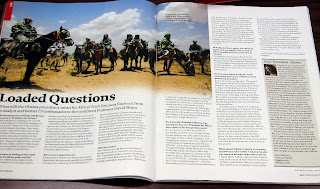BBC World Service asked me to comment 17 November, 2011, on Kenya’s request to the Arab League, which is meeting in Morocco, to support its intervention in Somalia.
I responded that Kenya is not a member of the Arab League but Somalia, represented by the Transitional Federal Government (TFG), is a member. I made the assumption that the TFG is in agreement with Kenya’s demarche to the Arab League. This is important, because the TFG president not long ago expressed concern about Kenya’s role in Somalia, while the TFG prime minister strongly supported it. If there is still disagreement within the TFG on the Kenyan intervention, I doubted that anything positive would come out of the Arab League meeting.
On the other hand, if the TFG and Kenya have coordinated their positions, it is possible the Arab League, which has been supportive of the TFG in the past, might issue a positive statement on Kenya’s involvement in Somalia. That said, the Arab League is not likely to offer any tangible support. A positive statement might, however, encourage one or more Arab League members on their own to offer tangible support.
Kenya has also offered, if asked, to provide a few battalions to the African Union force in Mogadishu (AMISOM). Djibouti and Sierra Leone have promised troops in the coming months to join the 9,700 Ugandan and Burundi troops already there. Even if Kenyan troops were to join this growing force, AMISOM is confined to Mogadishu and does not appear to have any intention of going any significant distance outside the capital.
Should Kenya succeed in removing al-Shabaab from a corridor along its border, including the key port town of Kismayu, and contribute troops to AMISOM in Mogadishu, this still leaves a huge piece of territory under the control of al-Shabaab between Mogadishu and whatever buffer zone the Kenyans are able to create along its border in southern Somalia.
Kenya may have a coherent long-term plan for countering al-Shabaab in Somalia. If that is the case, it is not apparent to me.



 In addition, a small number of Yemeni jihadis has joined al-Shabaab in Somalia, an organization that flaunts its connection with al Qaeda. Yemen is clearly the focus of U.S. interest as evidenced by
In addition, a small number of Yemeni jihadis has joined al-Shabaab in Somalia, an organization that flaunts its connection with al Qaeda. Yemen is clearly the focus of U.S. interest as evidenced by  This is where poverty and the other factors play a role. They create a negative, local environment which extremists can manipulate for their own reasons. And we are not just talking about Islamic extremists. The
This is where poverty and the other factors play a role. They create a negative, local environment which extremists can manipulate for their own reasons. And we are not just talking about Islamic extremists. The  Most of the participants focused on the president's call to Africans to take control of their own future and the need for good governance. I noted that he also emphasized a willingness by the United States to support development that offers real benefits to more people, especially the improvement of agriculture and food security.
Although he did not use the term in his speech in Ghana, he has called elsewhere for a green revolution in Africa. He also stated that the United States would continue the effort of President Bush to fight HIV/AIDS, malaria, and TB in Africa. He added to this list the eradication of polio and neglected tropical disease.
Finally, he stated that the United States would step up its efforts to prevent and mitigate conflict in Africa, noting in particular the on-going problems in Darfur, Somalia, and the Congo.
When asked what was left out of the speech, I suggested that I missed more emphasis on private American investment in Africa, as this could provide the most positive impact on improving African economies.
Most of the participants focused on the president's call to Africans to take control of their own future and the need for good governance. I noted that he also emphasized a willingness by the United States to support development that offers real benefits to more people, especially the improvement of agriculture and food security.
Although he did not use the term in his speech in Ghana, he has called elsewhere for a green revolution in Africa. He also stated that the United States would continue the effort of President Bush to fight HIV/AIDS, malaria, and TB in Africa. He added to this list the eradication of polio and neglected tropical disease.
Finally, he stated that the United States would step up its efforts to prevent and mitigate conflict in Africa, noting in particular the on-going problems in Darfur, Somalia, and the Congo.
When asked what was left out of the speech, I suggested that I missed more emphasis on private American investment in Africa, as this could provide the most positive impact on improving African economies.
 I had a phone interview today with the BBC World Service "
I had a phone interview today with the BBC World Service "


